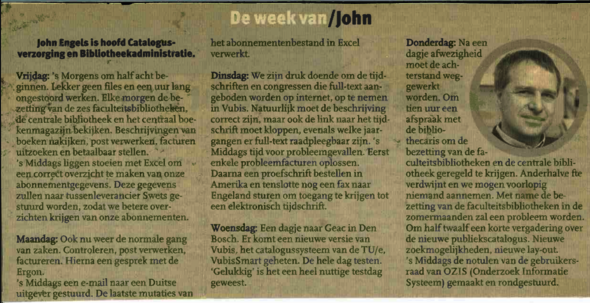Behind the Scenes | Librarian John Engels
Keeping a university running is no easy feat. It takes a lot of hands to make sure everything is in order, from administration to cleaning and from security to technical maintenance. Who are the unsung heroes behind the scenes keeping everything on track? In this series, Cursor shines the spotlight on TU/e employees. Today: Librarian John Engels.
John Engels has handled every book in the library at least six times. This is mainly because of the many moves that have taken place over the forty years he has worked here. The warehouse is set to relocate again soon, due to renovations needed after flooding, but Engels won’t be managing it this time. “My colleague and I have both turned 64, so this time we said: we’re not going to handle the entire move ourselves.”
More than 20 years ago, Engels was also featured in Cursor, in a similar column called “The week of”. “My mother proudly kept it at home.” At the time, he was head of Catalog Maintenance and Library Administration. He has held a range of positions since then, with many responsibilities, but no managerial duties. “I struggle with authority, not necessarily with hierarchy but with bossing others around. Hearing the words ‘you haveto’ is enough to rub me the wrong way. Within the team, we do everything in consultation.”
What time do you clock in?
“I work from home two days a week. On Tuesdays and Thursdays, I work here at the university and I start at 7:30 AM. That’s early, but it means I’m usually ahead of traffic. I finish at 4 PM so I can also avoid it after work. I don’t mind getting up early, I’ve never been one to sleep in. Throughout my entire career, I’ve always appreciated being able to get some work done in peace.”
What does your job involve exactly?
“At the moment, I mainly work with Pure, the system for registering the university’s scientific output. It’s also how the university showcases this output through the research portal. My main task is checking the data. Not the publications themselves, but all the data surrounding them. Sometimes an abbreviated name is incorrect or the proper punctuation is missing. I try to standardize those details. The metadata has to be accurate, though not everyone agrees on that. It’s a very time-consuming task.
We’re also digitizing the old printed graduation theses. We’re currently working on the last batch from the Philosophy department. I check the scans and upload them to Pure. That takes up a lot of my time.”
What led you to this job?
“After my military service, I studied at the Library and Documentation Academy. I interned here at the university as a Library Assistant/Title Describer. The job involved describing books by their attributes, such as the author, title, edition, publisher and ISBN. I think they noticed that I enjoyed it, because I was immediately offered a job. After six months, I became Head of Catalog and really got to dive into my hobby: cataloging. I loved it.”
What is the best part of your job?
“Working with colleagues and ensuring information is as accurate as possible. I was lucky enough to be able to turn my hobby into my job. I pay great attention to detail. My colleagues always say: John won’t rest until every period and comma are exactly where they should be. That’s also what the job demands. This was especially important early on during automation. Back then, the computer couldn’t properly read documents if there was incorrect punctuation, leading to erroneous data.
Some time ago, I received an email from a PhD candidate from 1969. He is now 92 years old. He had found his dissertation on our website 42 years later, but it contained errors. Isn't that remarkable? He had written an appendix to it and asked if we could add it. And we did, of course. Later, he even wrote an appendix to his appendix, but that’s beside the point. It’s nice to be able to help people. As long as I enjoy my work, I want to stay on until I’m 67. After that, I’ll continue cataloging somewhere else.”
And the least enjoyable part?
“That I can no longer do title descriptions. As a result of the automation and digitization, my hobby – traditional cataloging – has essentially ceased to exist. We used to get three thousand new books a year, and nowadays, we’re lucky to get three hundred a year, plus countless e-books. But it allowed me to take on the task of checking and registering in Pure instead. So I no longer catalog myself, but I work on the control side. There are a lot of errors there too. Even now with AI, controls remain necessary. The data must be correct.”
What time do you clock out?
“Four o’clock, sharp. That’s when I head home, or downstairs if I’m already there. I used to work overtime too. Sometimes, working overtime was considered the standard, but that bothered me. Some people believe you should work longer, but I’ve set clear boundaries in that regard. I make sure to get my hours in and finish my work at 4 PM.”
What do you do off the clock?
“I read, of course. I subscribe to several newsletters on history and I like to read horror books, four hundred pages a week, easily. In addition, my wife and I collect stamps. I’m also a trainer and coach at two volleyball clubs. On Sunday mornings, I play volleyball myself. I ended up there when they needed a data analyst to record the actions during a match. I’d register everything that happened on the court, typing without looking at the keyboard, so the coach could adjust his training and make an analysis for the next match.”
![[Translate to English:]](/fileadmin/_processed_/8/0/csm_JohnEngels-LA__1__2e59f964a9.jpg)



Discussion